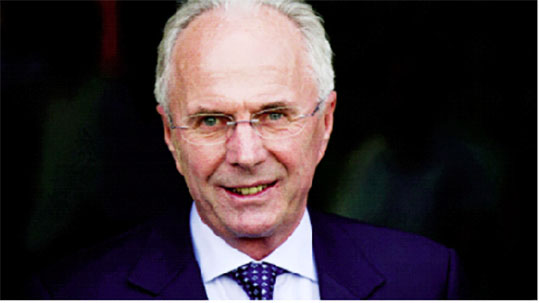STOCKHOLM, (Reuters) – Swedish football manager Sven-Goran Eriksson, who became the first foreigner to lead the England national team, died yesterday at the age of 76.
Eriksson, a charismatic coach who guided Swedish, Portuguese and Italian clubs to major trophies in the 1980s and 1990s before taking on the England job in 2001, announced in January that he was terminally ill with pancreatic cancer.
Eriksson’s long-time agent Bo Gustavsson said Eriksson had lost his battle with cancer early on Monday, surrounded by his family.
“We knew it was going to end bad, it all went really fast in the last few weeks,” Gustavsson told Reuters.
“I have been fascinated by him for a long time, he has always been so positive and has had time for others and never thought of himself, and he was that until the very end,” the agent added.
His two children, Lina and Johan Eriksson, thanked all those who had supported their father who they said had been deeply moved by the warm words he had received.
“I get to hear it while I’m alive and I’m incredibly grateful for that. The heart beats twice and the tears come,” Eriksson was quoted as having said in his children’s statement.
“I have had the best job in the world and I was happy every day for long periods. It’s been fantastic.”
Eriksson led England to the quarter-finals of the 2002 and 2006 World Cups, and to the 2004 European Championship, managing a golden generation of players, including David Beckham, Paul Scholes, Frank Lampard, Wayne Rooney and Steven Gerrard.
Eriksson will be remembered for his significant work with the England team, and for his wider contribution to the game, FA CEO Mark Bullingham said.
“On behalf of my colleagues at the FA, past and present, our thoughts are with his friends and family today. He will be much missed, and we will pay tribute to him when we play Finland at Wembley next month.” Bullingham wrote on X.
Eriksson first gained international recognition by guiding Swedish club IFK Gothenburg to the UEFA Cup title in 1982, and went on to a successful career at Portugal’s Benfica and Italian clubs AS Roma, Fiorentina, Lazio and Sampdoria.
Politicians, former clubs and players praised Eriksson.
Alessandro Nesta, who was captain of Lazio’s team under Eriksson and is now coach of Serie A Monza, said on X: “Rest in peace great Coach and extraordinary person. I will always carry you in my heart.”
Italy’s soccer federation said matches in the country’s top two divisions would be preceded by a minute’s silence in Eriksson’s honour.
“Thanks for all the memories. We will never forget you,” Gothenburg said in a statement.
“Thank you for everything you have done for us, mister,” Lazio Sports Club said on X.
“Rest in peace, mister,” Portugal’s Benfica, where Eriksson had two stints as manager, wrote on X.
Accolades flowed in from prime ministers, including Britain’s Keir Starmer and Italy’s Giorgia Meloni.
“He will be remembered for his tremendous contribution to English football which brought joy to so many over the years,” Starmer said on X.
In his native Sweden, where he is known simply as “Svennis”, Eriksson was praised as a great sports leader.
“Sven-Goran ‘Svennis’ Eriksson has left us but lives on in the hearts of the Swedish people. Svennis’ importance to football in Sweden and outside Sweden cannot be overestimated,” Swedish Prime Minister Ulf Kristersson said on Instagram.
After leaving the England job in 2006, Eriksson coached Manchester City and Leicester City as well as the Mexico and Ivory Coast national sides and clubs in China and the Philippines.
He fulfilled a career ambition to take charge of a Liverpool team at Anfield when he coached the Reds Legends in a charity match in March.
“Rest in peace, Sven-Goran Eriksson. The thoughts of everyone at the club are with Sven’s family and friends at this extremely sad time,” Liverpool said on X.








